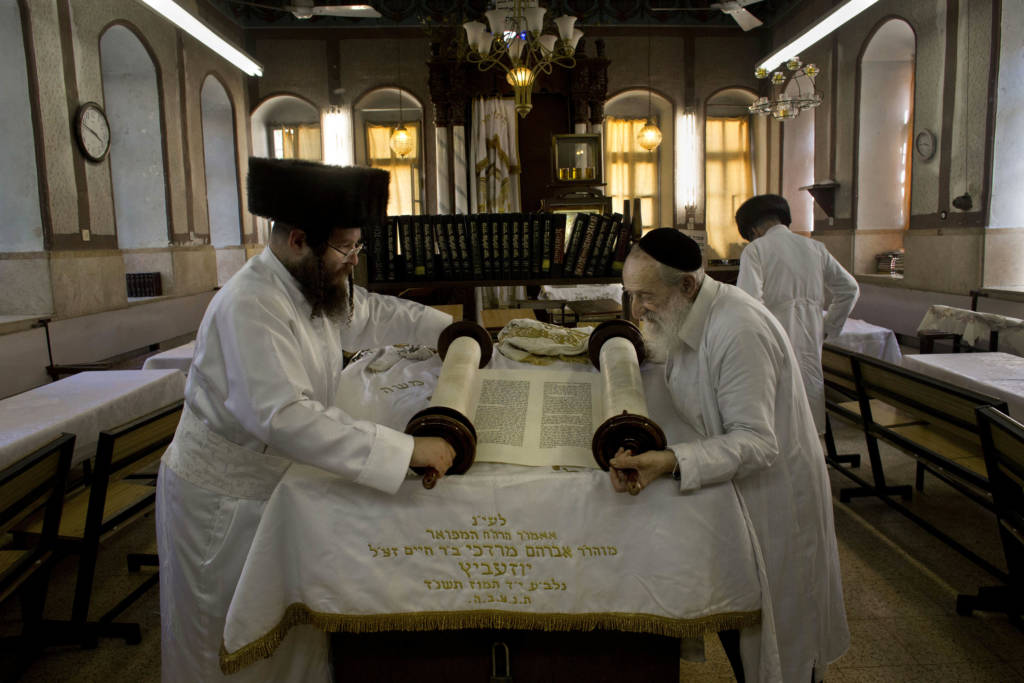Did you know that writings with God’s name in them must be treated with reverence and cannot simply be tossed in the garbage?
By: Rabbi Ari Enkin, Rabbinic Director, United with Israel
This week’s Torah portion is “Re’eh” (Deuteronomy 11:26–16:17) and it is packed with commandments–over 50, in fact, including the lesser known concepts of “sheimot” and “genizah.” These terms which refer to the requirement to bury Torah scrolls and other ritual items that have become worn out or otherwise unusable.
In this week’s portion, the Torah commands us to destroy any traces of idolatry in the land of Israel (no, I am not encouraging you to go and do so…speak to a lawyer first), as it says “You shall thoroughly destroy all the places where the Gentiles that you are driving away worshiped their gods – on the mountains and on the hills, and under every tree. You shall destroy their altars, you shall smash their pillars, and you shall burn their sacred trees. You shall cut down their carved images and you shall obliterate their names from that place.” The Torah then says, “You shall not do the same to your God” (12:2-4)
The Talmud derives from this passage that while we must destroy anything that is or was associated with idolatry, we must never destroy anything related to God and Torah. Even erasing God’s name once it has been written on any surface, is forbidden.
From here comes the requirement of “sheimot” or “genizah.” Holy items that are no longer usable may not simply be tossed into the garbage like a candy wrapper or empty can of tuna. Holy items must be properly disposed of.
This is why worn out Torah scrolls prayers books, mezuzah scrolls, and other items are buried. Burial is considered the most dignified form of “disposal.”
Closely related to this is the practice to bury the dead, as it is the most respectful way to handle and dead body and say goodbye to a person. A person is a holy object too!
Every Jewish cemetery has an area designated for the burial of Holy items. A Torah scroll that has worn out is often buried alongside a Torah scholar as an added measure of respect to both the Torah and the scholar.
The mitzva of “You shall not do the same to your God” applies to any item on which one of God’s seven holy names is written in Hebrew (which of course primarily applies to Torah scrolls and Mezuzahs that have God’s name written in Hebrew multiple times). These names are regularly used in the course of study and prayer nowadays
Other ritual items such as ripped tzitzit strings, tithes from produce, or an English article on the weekly Torah portion that does not include God’s name (like this one!) have different rules. Such items need not be buried, but they too, may not simply be thrown into a garbage. Where appropriate, such items should be recycled, or as a last resort, double wrapped and then placed into the household garbage.
This mitzvah is also a reminder for us to show extreme reverence for God and anything associated with Him. For this same reason, many people write “G-d” instead of “God” though there is no true requirement to do so.
Although most of us do not have the need to arrange for burial of religious articles too frequently, the source for this requirement, the mitzva to show reverence for God, is indeed certainly relevant to all of us.
Unfortunately, the “liberal” and loose world we live in has a way of desensitizing us to all that is holy. Let us use this week’s Torah portion to strengthen our reverence and respect for that which is holy, and remember that some things just can’t be treated like “trash,” no matter what society might say.
For more insights by Rabbi Enkin on this week’s Torah portion, click on the links below.
https://unitedwithisrael.org/how-much-charity-is-too-much/
https://unitedwithisrael.org/choose-blessing/
https://unitedwithisrael.org/living-torah-count-your-blessings/
Do You Love Israel? Make a Donation - Show Your Support!
Donate to vital charities that help protect Israeli citizens and inspire millions around the world to support Israel too!
Now more than ever, Israel needs your help to fight and win the war -- including on the battlefield of public opinion.
Antisemitism, anti-Israel bias and boycotts are out of control. Israel's enemies are inciting terror and violence against innocent Israelis and Jews around the world. Help us fight back!
